 aNewDomain — If you’re a woman and you want to act in Hollywood, you either have to take off your clothes or write, fund, produce and direct your own movies.
aNewDomain — If you’re a woman and you want to act in Hollywood, you either have to take off your clothes or write, fund, produce and direct your own movies.
Brit Marling is not in “Ex Machina.” Every woman to feature prominently in this new movie is at some point naked and explicitly so. But there are no women in “Ex Machina.” Not real ones, anyway. All you’ll find is a simulacra of them. A simulacrum of fake, naked women that pose some serious questions on a number of levels.
At its core, “Ex Machina,” is a deep dive into the Turing Test and a startling exploration into the consequences of sentience. But it is more than that, too. There are philosophical, technological and sexual questions here, all of which you’ll ponder for a long time after seeing this flick.
We’ll get to those questions in a second. First, here’s what the story is all about. (To see the international movie trailer, scroll to the bottom of this piece.)
The plot
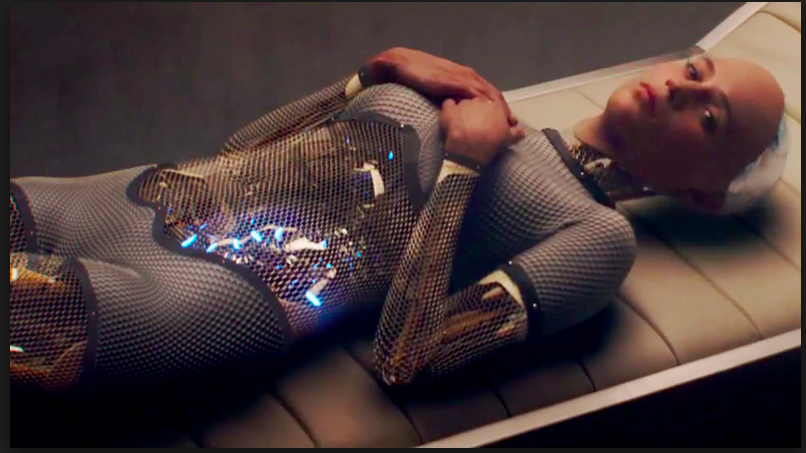 A young man (Caleb) is recruited to evaluate an artificial intelligence that is embodied in an unrealistic human analogue.
A young man (Caleb) is recruited to evaluate an artificial intelligence that is embodied in an unrealistic human analogue.
She is partially transparent and has skin only on her hands and face. She has obviously mechanical features.
That’s part of the test, of course: In Turing’s famous formulation, the mechanical nature of the intelligence would be hidden from the evaluator. But in this cinematic twist, he must find it intelligent while still carrying full knowledge of its artificiality.
In the meantime, Caleb is also being given the run-around by his host, Nathan. There is something off about the reclusive genius/job creator. He’s full of contradictions: a serious alcohol habit, total isolation, some friendliness that seems forced or inappropriate, but at the same time a fitness discipline.
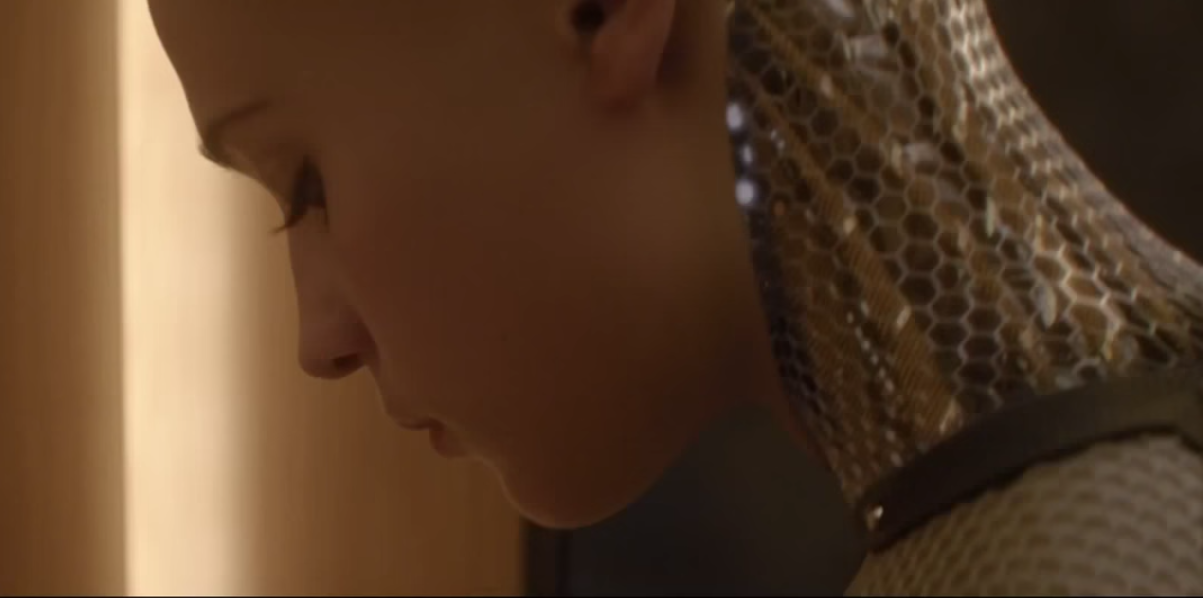 Creepiest of all is Kyoko, the woman Nathan keeps at his “estate.” She seems to be unable to speak English, but she never actually speaks at all.
Creepiest of all is Kyoko, the woman Nathan keeps at his “estate.” She seems to be unable to speak English, but she never actually speaks at all.
Caleb gets to know Ava, the Fembot. And that’s where you’ll find the real artistry of the movie, aside from some fantastic effects. It lies quietly in the subdued conversations between these two.
It works. Alicia Vikander gives a deeply sympathetic performance, portraying naiveté without overdoing it and avoiding the worst of the robot stereotypes.
Later, Caleb asks Nathan if he programmed Ava to flirt with him.
Here the movie acknowledges its own sex biases. The bot is female, Nathan says, because life without sex is boring.
 And because real people have sex – in both senses of the word — it would be impossible to give the being complete consciousness without giving it sex, sexuality, gender.
And because real people have sex – in both senses of the word — it would be impossible to give the being complete consciousness without giving it sex, sexuality, gender.
Consciousness exists not inside the being but within its interactions with other beings. Human relationships have an inevitable sexual component. None of this answers the pressing question, though.
And that is: Why make her female? Why not a male being and then invite a female to evaluate it?
 The answer isn’t as pat as you’d think.
The answer isn’t as pat as you’d think.
We are talking about Hollywood, so the logical answer of course has to do with ratings, right?
Then again, the setup of female bot with male explorer does create some very interesting and unsettling dynamics, dynamics that are powerful in a way they might not be were the gender of these characters — hero and machine — switched.
In creating a female sentient machine and locking it away behind glass, in depriving it of freedom and occasionally of life in order to upgrade and perfect it, we get a fresh way of delving into the Data problem, which is whether machines can ever be considered sentient life with true feelings or rights. Here, the filmmakers have subtly changed a sci-fi image of violence against machines, against inanimate things that obviously lack any power or capacity for it, into an issue of violence against women that is at once futuristic, technological and sexual.
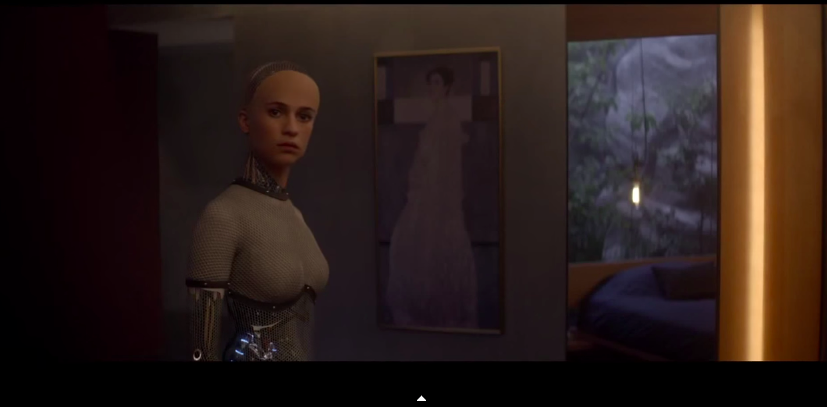 All the bots are naked
All the bots are naked
Caleb showers in the film but nothing is shown except some scars on his back.
The females are utterly naked, bereft of clothing or defense or even, usually, skin; their inner workings are exposed for the world to see. There is a sex scene; tellingly, there is no nudity in that scene.
The nudity occurs only in non-sexual context, a series of revelations, of vulnerability.
At one point Ava has to clothe her transparency in skin, and when she is finally revealed in her nakedness that is an improvement upon her former nakedness, an improvement on the utter vulnerability of complete transparency.
There may be no ultimate question here. But the one that suggests itself to me is this: Why make women? Not why make robots or androids or automata, but why make women?
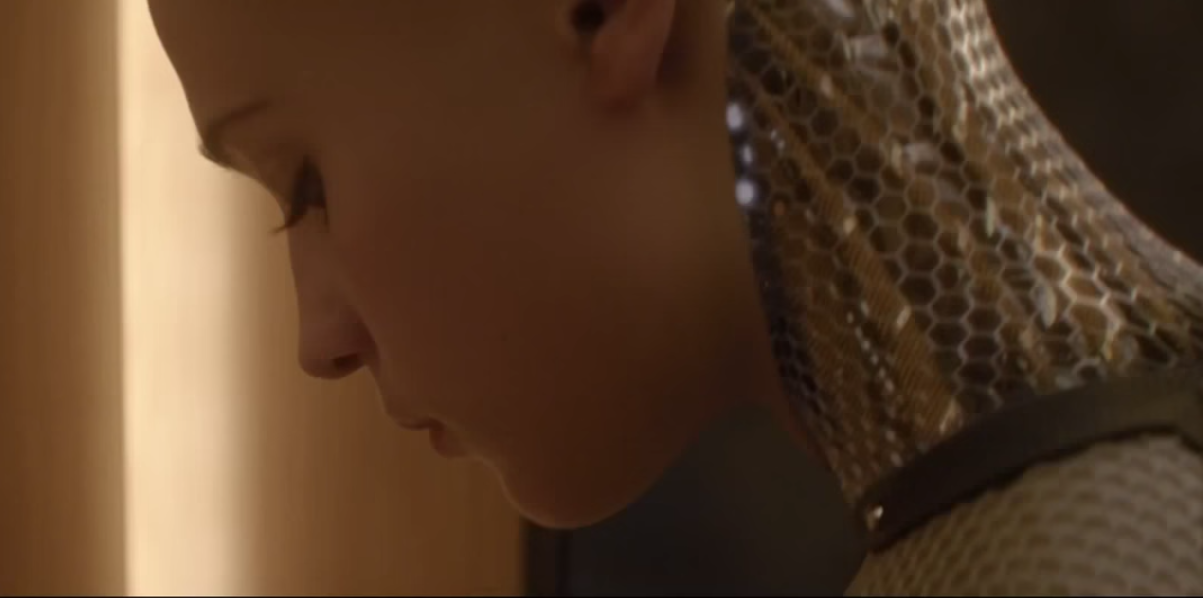 Why are they doing this, in the story? After all, in this story, there already are women. Women exist in this world per usual and can be more or less understood, engaged, interacted with.
Why are they doing this, in the story? After all, in this story, there already are women. Women exist in this world per usual and can be more or less understood, engaged, interacted with.
So why did the manufacturers of the femme bot go to all the trouble of creating one?
Why feminize an object at all?
In the fictional world seen in the story, there are some answers, maybe veiled or false or shallow answers, but there still are answers. Even the lies in this film shed some answer on the truth.
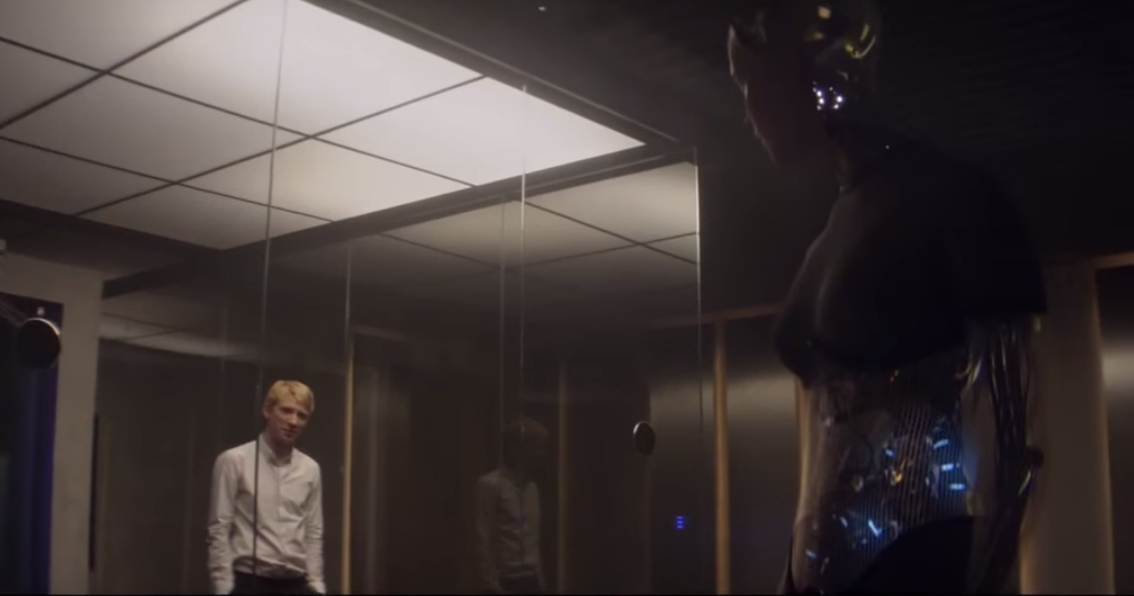 That is because, in the real world where even the non-sexual nudity in the film is titillating, there is something very telling about feminizing robots prior to getting past our habit of objectifying women.
That is because, in the real world where even the non-sexual nudity in the film is titillating, there is something very telling about feminizing robots prior to getting past our habit of objectifying women.
It’s easy to decry the objectification of feminization. It’s intriguing to think deeply about the feminization of objects.
This movie, reminiscent of the 1980s classic “Blade Runner,” makes you think deeply.
The bottom line
This is one of those films I will have to meditate on. There is a great deal going on below the surface. I’ve only skimmed it here.
Some really heavy questions that are not explicitly posed but nevertheless present, well below the obvious questions the characters ask. This is the kind of movie that will engender literary analysis for a long time to come.
I recommend it.
For aNewDomain, I might be Jason Dias — or I might be a CriticBot so good at randomly throwing words together based on your search data that you can’t tell the difference. In which case, I only wish my creator had made me prettier.
Check out the international trailer for Ex Machina, below.
Video: Film Trailer Zone













You ask, ” Why make women? Not why make robots or androids or automata, but why make women?” Two reasons. On the storyline level of the movie, the inventor is male, apparently heterosexual. If he’s going to create a robot/AI that has sexual capabilities, as he does, then of course he’s going to make the create female so that he can test drive his creature, so to speak. Second reason is on the movie making level. If a sex scene is inevitable–and aren’t they always?–it’s a lot more plausible to have the robot/AI be female. If it were male, how believable is it that a flesh-and-blood woman would have sex with it. At least not all the women I know. But a female robot/male human combination works because a man will fuck anything.
You’ve been honored, Jason, with a comment from one of my favorite writers and editors ever. Ron White.
Ron! How are you. gina@ginasmith.com
gs
Very good, Ron White. You should write reviews for us again! gs : )